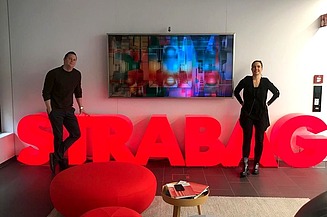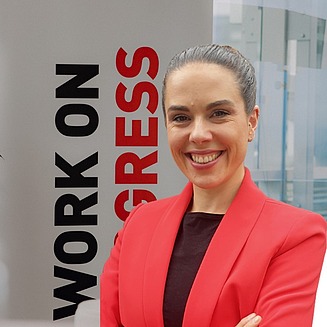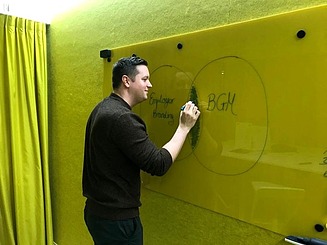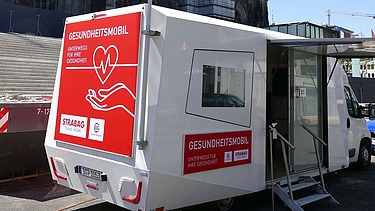The impact of health management on employer attractiveness.


Could you briefly introduce yourself and tell us how long you have been working in the field of employer branding?
Svenja: My name is Svenja Kellner and I have been working at STRABAG since May 2017.
I am responsible for employer branding and employee experience within the Group and lead the central People & Culture Marketing team both professionally and disciplinarily. Together with my team, we work on positioning STRABAG as an employer and making it a tangible experience.

Could you briefly introduce yourself and tell us how long you've been in the health management field?
Niklas: My name is Niklas Magerl and I joined the Group in March 2019. I design and develop health management in Germany and support the team management in international controlling, for example. We want to promote a healthy corporate culture within STRABAG and enable target group-specific health offers for the workforce. At the turn of the year 2023, I will move to change management in the Group, where I will help shape and support change processes.
Employer Branding
Can you briefly describe what employer branding means to you?
Svenja: For me, employer branding work means working out what an employer has to offer in order to distinguish itself credibly on the labor market and to attract and retain the best talent.
Of course, this is about the workplace product itself and how it is branded and marketed, but it is also very much about cultural work.
Have you observed any current trends in employer branding in 2022? Which ones?
Svenja: Yes, the trend is increasingly toward employee branding and less employer branding. Good employer brands grow from the inside out. And as a rule, people are more likely to follow people than companies. It is then often not the big and expensive glossy campaigns, but the own employees who make the difference. If a company recognizes this and supports it accordingly, it can also save itself a lot of money.
Another trend, or perhaps rather a new concept, is job or opportunity branding. In employer branding you formulate a promise for all your target groups, the so-called Employer Value Proposition (EVP) and in job branding it's more about the challenge of the position that is put in the foreground and what role it plays for the organization. I think that's coming into focus in the near future.
What do you mean by employer attractiveness?
Svenja: For me, employer attractiveness is the sum of all the characteristics and activities that make an employer interesting, so that employees like working there and it seems worthwhile to apply there. Employer attractiveness is definitely an important basis for successful employer branding.
In your experience, what factors are important for the attractiveness of a company?
Svenja: The basics must be there in any case. The so-called hygiene factors, such as attractive salary, career opportunities, flexible working hours, etc., are nowadays a prerequisite for many applicants. But also the emotional factors, how do I feel when I go to work in the morning? Does my work make sense to me? Perhaps one that goes beyond the work itself? Can I develop personally and professionally in the company? An attractive employer must address these issues. This is where the topic of culture comes into play again, especially leadership culture. Do I have managers in my company who empower employees or keep them down? Of course, this also plays a decisive role in the topic.

Influence of health management on employer attractiveness
What do you understand by the term "health management"?
Niklas: By this we mean a systematic design of workplace health promotion within a project-oriented way of working. Health management should integrate, promote and further develop a healthy work culture in the corporate context. In order to be able to evaluate the sustainability and success of health measures, health controlling must be carried out, which should then be used to develop new health measures in the company.
What measures are typically part of the Health Managmenet for you?
Niklas: Of course, knowledge transfer and edutainment can reach the workforce in different ways: Whether workshops, coachings, trainings, e-learnings, webinars etc. there are many possibilities. Thematically, a BGM moves mainly between the so-called fields of action of health: exercise, nutrition and stress / psyche. But also a classification of health measures for behavioral prevention (healthy behavior) and for relationship prevention (creation of healthy work structures and conditions) typically belongs to health management.
How could health management be used in the external presentation of a company?
Niklas: At best, this should take place in a multimedia way. For example, in collaboration with cooperation partners, sharing health offers on social media and, of course, last but not least: Also pointing out the existence and contents of a company health management in job advertisements.
What influence do you think health management can have on a company's attractiveness as an employer?
Svenja: An employer who values the health of its employees is already attractive per se, in my opinion. Maybe many don't think so, but employer branding work and health management are very much related and strongly influence each other. "Burn-out," engagement, corporate culture, healthy leadership and mental health are a few of the topics where employer branding or employee experience and health management meet. That's why I'm glad that we have such a great Helath Management team, where we can bring in from Employer Branding and vice versa.
Do you think companies with health management have an advantage in the applicant market?
Svenja: I think especially with interested parties who classify health as a high value in any case and generally also if you make it visible.
Niklas: Anyone who has ever been involved with existing health management at a company often also wants this at the next company. Modern and target group-specific measures create desire.
Are there measures that are particularly well received by applicants? Which ones?
Niklas: If they are specific to the target group! Commercial employees often have different health interests than employees at office locations. As an example, we have our health mobile. This is a vehicle that travels to various construction sites in Germany. There, the industrial employees are given the opportunity to undergo various screenings. For example, back strength diagnostics, cardiovascular diagnostics and much more. Of course, health measures should also be geared to the wishes and needs of the participants - then the probability of a high number of participants increases.

Are there measures that are less interesting for applicants? Which ones?
Niklas: These are the health measures that go past health problems and focal points of interest. People often do not participate in uninteresting health measures, so they must be didactically and thematically suitable for the respective target group!
In your experience, are there any basic requirements for the successful implementation of health management and health measures in companies?
Niklas: Depending on the legislation in the country, there should be a comprehensive basic understanding of the healthcare system and the institutions involved there. In terms of methodological competence, the conceptualization of health measures and an analysis of incapacity to work statistics should also be available. In addition, the commitment of the management is of course a basic requirement for the implementation of a health management system in the company.
What do you think is important for health management to have a lasting positive impact on employer attractiveness?
Niklas: The further development of health management should be defined responsibly by the people involved - but health management as a department should not fall into a silo mentality. For this reason, interdisciplinary cooperation with other People & Culture or HR processes, integration into corporate processes, etc. is very important.
What can companies do to ensure that BGM measures are internalized by employees?
Niklas: First and foremost, promoting participation - cooperation in the design of health measures and involvement, as we do at STRABAG in so-called BGM site teams. This creates identity and thus increases the approval of health measures. In addition, an attempt should be made within the health management system to implement the wishes and concerns of the workforce with regard to health issues. This also helps employees to identify with the health management system.